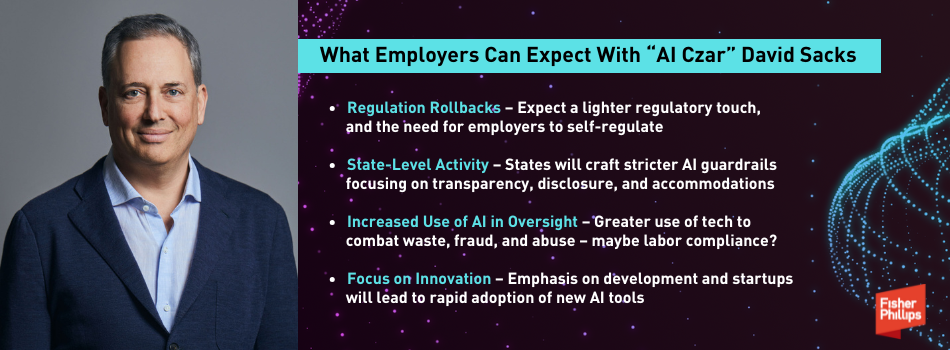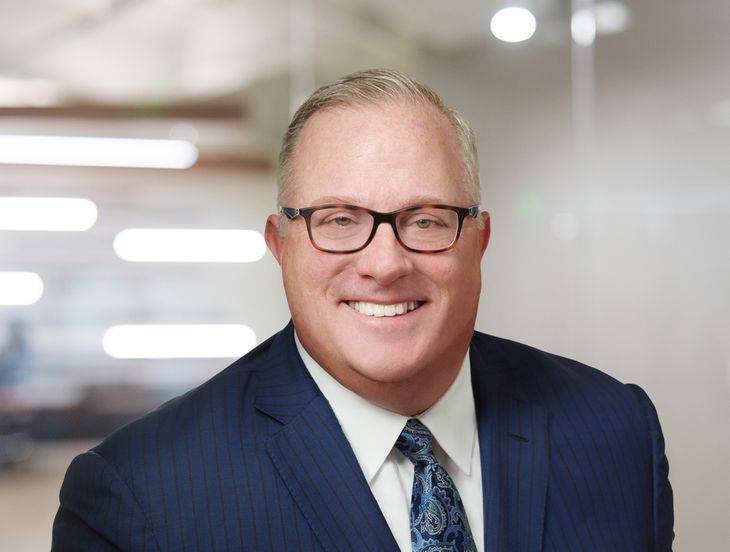David Sacks Named AI Czar: What Employers Need to Know About a New Era of AI Oversight
Insights
12.27.24
President-elect Donald Trump’s recent appointment of David Sacks as the new “AI & Crypto Czar” signals a major shift in how the federal government plans to approach artificial intelligence and its role in the workplace. Sacks – a Big Tech veteran, Silicon Valley insider, and vocal advocate for deregulation – will likely oversee a seismic transformation in how AI will be regulated and integrated across industries. The emphasis will be on innovation and industry collaboration, and for employers, this means a flurry of new workplace AI tools that you’ll need to track and integrate. But with light-touch regulation comes potential challenges, making it critical for businesses to prepare for a changing landscape.
What Happened
The December 5 announcement of the nation’s first AI Czar is designed to shape federal policy on emerging technologies. This part-time advisory position, which bypasses Senate confirmation and traditional oversight mechanisms, places Sacks at the center of the AI sector. Working alongside other tech allies in the administration – including Elon Musk – Sacks will be tasked with crafting a legal framework that minimizes regulation while encouraging innovation and private sector growth.
Sacks’ new position will also see him chairing the President’s Council of Advisors on Science and Technology (PCAST), signaling a commitment to maintaining an open dialogue between policymakers and the tech industry. While the specifics remain unclear, his influence is likely to be significant when it comes to shaping policies related to AI in business and employment settings.
Sacks’ Background
David Sacks is no stranger to the tech world or the national spotlight. A co-founder of PayPal, Sacks’ ties to Silicon Valley’s most prominent figures – including Musk and Peter Thiel – run deep. In recent years, Sacks has positioned himself as a vocal critic of what he describes as “Big Tech censorship” and excessive regulation. His podcast, All-In, has become a platform for conservative-libertarian views on technology, economics, and governance.
Sacks also brings hands-on experience with AI. This year, he launched Glue, an AI-powered work chat app that promises to streamline workplace communication. His approach to AI emphasizes open ecosystems and competition, a philosophy that aligns with the Trump administration’s broader deregulatory agenda.
What Employers Can Expect
For employers, Sacks’ appointment marks a potential pivot away from the regulatory framework introduced during the Biden administration. Here are some key areas for businesses to consider:
Regulation Rollbacks
This appointment is yet another nail in the coffin for President Biden’s executive order on AI, which pushed for safeguards against bias and workplace fairness. Employers can expect a lighter regulatory touch in the next four years. But with that comes an increased burden to self-regulate and ensure compliance with existing anti-discrimination and labor laws, as plaintiffs’ attorneys will be aggressive in their pursuit of possible violations. This further illustrates the need for companies to develop their AI governance systems and policies.
State-Level Activity
As federal oversight potentially loosens, states like California and New York are likely to be next in line in crafting stricter AI regulations. These two states and others will join Colorado and Illinois in developing rules requiring transparency, disclosure, and possible accommodations to the workplace use of AI in hiring (which may already be required by the ADA). This could create a patchwork of rules, requiring multistate employers to align with the most stringent standards.
Increased Use of AI in Oversight
The Trump administration has hinted at leveraging AI to combat waste, fraud, and abuse in entitlement programs, especially by the DOGE initiative. This signals a broader acceptance of AI’s role in governance, which could extend to labor compliance monitoring. Anticipate that agencies like the EEOC will develop ways to use predictive analytics and AI to focus their investigative resources on specific claims.
Focus on Innovation
Policies under Sacks are expected to favor innovation over regulation, with an emphasis on open-source AI development and minimizing barriers for startups. This could lead to rapid adoption of new AI tools, but also heightened risks around data privacy and ethical use.
Practical Suggestions for Businesses
To navigate the evolving AI landscape, employers should consider taking the following steps:
- Take Care When Adopting New AI Systems: Know which questions you should ask of your AI vendors when deploying AI systems.
- Audit Existing AI Tools: Review all AI-driven tools currently in use, from hiring algorithms to productivity trackers. Ensure they align with federal anti-discrimination laws, are free from bias, and comply with existing laws regarding employee monitoring and privacy.
- Get Your AI Governance House in Order: AI governance should be a must-have on your 2025 checklist. Develop and deploy risk-management systems to protect your organization from flawed AI systems. Setting up your systems to ensure they align with your business goals, comply with regulations, and operate ethically will be critical in the self-governance era.
- Stay Ahead of State Regulations:States will lead regulation on AI. Monitor developments in key states that are advancing their own AI legislation. Make sure you are signed up to receive AI updates from the FP Insight System to stay up to speed.
- Invest in Training: Equip HR teams and managers with training on AI ethics and compliance. Understanding the strengths and limitations of AI tools is essential for responsible use.
- Emphasize Transparency: Be upfront with employees about how AI is used in the workplace, whether it’s in hiring, performance evaluations, or day-to-day operations. Transparency builds trust and reduces the risk of legal challenges.
- Prepare for Rapid Changes: The deregulatory approach under Sacks may lead to rapid advancements in AI applications. Businesses should be prepared to adopt new tools while staying compliant with evolving standards.
- Engage with Legal Counsel: Partner with legal advisors who specialize in AI and employment law to navigate the complexities of changing policies and ensure compliance.
Conclusion
We will continue to provide the most up-to-date information on AI-related developments, so make sure you are subscribed to Fisher Phillips’ Insight System. If you have questions, contact your Fisher Phillips attorney, the authors of this Insight, or any attorney in our AI, Data, and Analytics Practice Group or Government Relations Practice Group.
Related People
-
- Richard R. Meneghello
- Chief Content Officer


